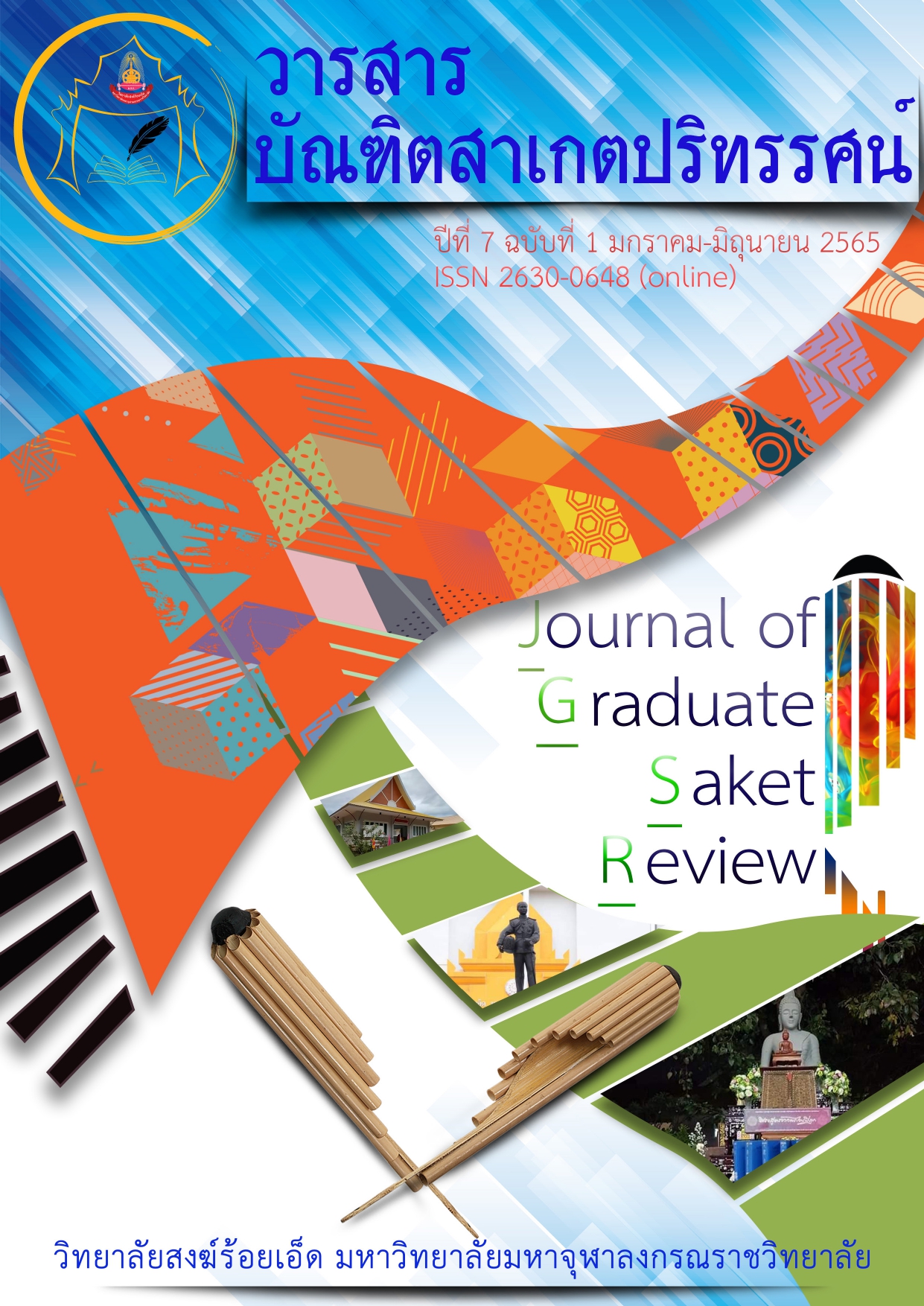ภาวะผู้นำแบบเหนือชั้นตามแนวพุทธศาสนาในยุคดิจิทัล
Main Article Content
บทคัดย่อ
บทความนี้มีวัตถุประสงค์เพื่อศึกษาภาวะผู้นำแบบเหนือชั้นตามแนวพุทธศาสนาในยุคดิจิทัล จากการศึกษาพบว่าผู้นำในยุคดิจิทัลจำเป็นที่จะต้องเข้าใจทิศทางการเปลี่ยนแปลงองค์การ โดยการปรับองค์กรให้สามารถปรับตัวได้อย่างรวดเร็วและทำให้องค์กรพร้อมที่จะเรียนรู้ทักษะใหม่ๆ ตลอดเวลา ภาวะผู้นำแบบเหนือชั้นตามแนวพุทธศาสนาในยุคดิจิทัลควรมีทักษะภาวะผู้นำดังนี้ 1)การสร้างทีมงานที่มีประสิทธิผลสูง 2)การแก้ปัญหา 3)การวางแผน 4)การกำกับการปฏิบัติงานและการสื่อสารที่ดี 5)การสร้างสัมพันธ์และการสอนงาน 6)การสร้างสังคมและการตัดสินใจ 7)การกระตุ้นจูงใจ การคิดเชิงสะท้อนและการจัดการตนเอง การใช้เทคโนโลยี 8)การเรียนการสอน 9)ความฉลาดทางอารมณ์ และ 10)การบริหารที่ยืดหยุ่นและปรับเปลี่ยนไปตามสถานการณ์ โดยบูรณาการหลักพรหมวิหารธรรม 4 เพื่อนำพาองค์การเปลี่ยนแปลงไปอย่างมีประสิทธิภาพเป็นองค์กรที่เป็นเลิศในการบริหารจัดการต่อไป
Article Details

อนุญาตภายใต้เงื่อนไข Creative Commons Attribution-NonCommercial-NoDerivatives 4.0 International License.
เนื้อหาและข้อมูลในบทความที่ลงตีพิมพ์ในวารสารบัณฑิตสาเกตปริทรรศน์ ถือเป็นข้อคิดเห็นและความรับผิดชอบของผู้เขียนบทความโดยตรงซึ่งกองบรรณาธิการวารสาร ไม่จำเป็นต้องเห็นด้วย หรือร่วมรับผิดชอบใด ๆบทความ ข้อมูล เนื้อหา รูปภาพ ฯลฯ ที่ได้รับการตีพิมพ์ในวารสารบัณฑิตสาเกตปริทรรศน์ ถือเป็นลิขสิทธิ์ของวารสารบัณฑิตสาเกตปริทรรศน์ หากบุคคลหรือหน่วยงานใดต้องการนำทั้งหมดหรือส่วนหนึ่งส่วนใดไปเผยแพร่ต่อหรือเพื่อกระทำการใด ๆ จะต้องได้รับอนุญาตเป็นลายลักอักษรจากวารสารบัณฑิตสาเกตปริทรรศน์ ก่อนเท่านั้น
เอกสารอ้างอิง
เชาวนุช สว่างชาติ และพิมพ์อร สดเอี่ยม. (2561). ปัจจัยภาวะผู้นำแบบเหนือชั้นของผู้บริหารสถานศึกษาที่ส่งผลต่อประสิทธิผล ของโรงเรียนเทศบาลในเขตจังหวัดเลย. วารสาร มจร พุทธปัญญาปริทรรศน์, 3(3), 335-350.
ธัญธัช วิภัติภูมิประเทศ. (2562). สังคมวิทยาดิจิทัล : แนวคิดและการนำไปใช้. วารสารราชภัฏสุราษฎร์ธาน, 6(1), 43-56.
พระธรรมโกศาจารย์(ประยูร ธมฺมจิตฺโต). (2549). พุทธวิธีบริหาร. กรุงเทพมหานคร: โรงพิมพ์มหาวิทยาลัยมหาจุฬาลงกรณราชวิทยาลัย.
พระธรรมฐิติญาณ. (2552). ธรรมฐิติญาณุสรณ์. ร้อยเอ็ด: ทันใจการพิมพ์.
พระพรหมคุณาภรณ์(ป. อ. ปยุตฺโต). (2550). ภาวะผู้นำ. กรุงเทพมหานคร: สุขภาพใจ.
พระเมธีธรรมาภรณ์(ประยูร ธมฺมจิตฺโต). (2534). คุณธรรมสำหรับนักบริหาร. กรุงเทพมหานคร: มูลนิธิพุทธธรรม.
วชิระ ดวงมาตย์พล. (2557). การพัฒนาตัวบ่งชี้ภาวะผู้นำแบบเหนือชั้นของผู้บริหารสถานศึกษาขั้นพื้นฐาน สังกัดองค์การบริหารส่วนจังหวัด. วิทยานิพนธ์ปริญญาดุษฎีบัณฑิต สาขาวิชาการบริหารการศึกษา. บัณฑิตวิทยาลัย : มหาวิทยาลัยราชภัฏเลย.
เศกสรรค์ ปัญญาแก้ว.(2560). ภาวะผู้นำแบบเหนือชั้น. สืบค้นเมื่อ 24 สิงหาคม 2564, จาก https://data.bopp-obec.info/emis/news/news_view.php?ID_New=49002
สำนักงานเลขานุการของคณะกรรมการยุทธศาสตร์ชาติ. (2561). ยุทธศาสตร์ชาติ พ.ศ. 2561 – 2580 (ฉบับย่อ). กรุงเทพมหานคร: สำนักงานเลขานุการของคณะกรรมการยุทธศาสตร์ชาติ สำนักงานคณะกรรมการพัฒนาการเศรษฐกิจและสังคมแห่งชาติ.
อภิวิชญ์ ตันตุลา, ภิญโญ มนูศิลป์, ยุพร ริมชลการ. (2558). ปัจจัยที่ส่งผลต่อภาวะผู้นำแบบเหนือชั้นของผู้บริหารสถานศึกษา โรงเรียนสังกัดสำนักงานเขตพื้นที่การศึกษาประถมศึกษาเลย เขต 1. วารสารมนุษยศาสตร์และสังคมศาสตร์ มหาวิทยาลัยราชภัฏพิบูลสงคราม, 9(2), 184-206.
Cradona. (2000). Transcendental leadership. Leadership & Organization Development Journal, 21(4), 201-207.
Sanders, Hopkins และ Geroy. (2003). From Transactional to Transcendental: Toward An Integrated Theory of Leadership. Searched 24 August 2021, จากhttps://www.researchgate.net/publication/250961864_From_Transactional_to_Transcendental_Toward_An_Integrated_Theory_of_Leadership


